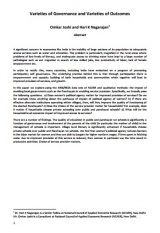Varieties of Governance and Varieties of Outcomes
Hari K. Nagarajan
Omkar Joshi
May 2012
A significant concern in economies like India is the inability of large sections of its population to adequately access services such as water and education. This problem is particularly magnified in the rural areas where problems of low levels of literacy, and inadequate access to drinking water have lead to a large number of pathologies such as out migration in search of low skilled jobs, low productivity of labor, lack of female empowerment etc.
In order to rectify this, many countries, including India have embarked on a program of promoting participatory self governance. The underlying premise behind this is that through participation there is empowerment and capacity building of both households and communities which together will lead to improved provision of services, and growth.
In this paper we explore-using the ARIS/REDS data sets of NCAER and qualitative methods- the impact of enabling local governments such as the Panchayats in enabling service provision. Specifically, we broadly pose the following questions. a) Does women’s political agency matter for improved provision of services? Do we for example know anything about the pathways of impact of political agency of women? b) If there are effective alternate institutions operating within villages, then, will they improve the quality of functioning of the elected Panchayats? c) Does the choice of the service provider matter for households? For example, does it matter if households choose private schooling over public and panchayat schools? d) What will be the household level economic impact of improved access to services?
There are a number of findings. The quality of education in public and panchayat run schools is significantly a function of governance and involvement of the parents of the child (in particular the mother of child) in the management of schools is important. Village level literacy is significantly enhanced if households choose private schools over public and Panchayat run schools. We find that women’s political agency reduces barriers in the labor market for women and they are able to bargain for higher nonfarm wages. If time spent in fetching water due to improved provision of this service is reduced, then women in particular use the time saved in productive activities. Choice of service provider matters.
Agriculture and Rural Development







